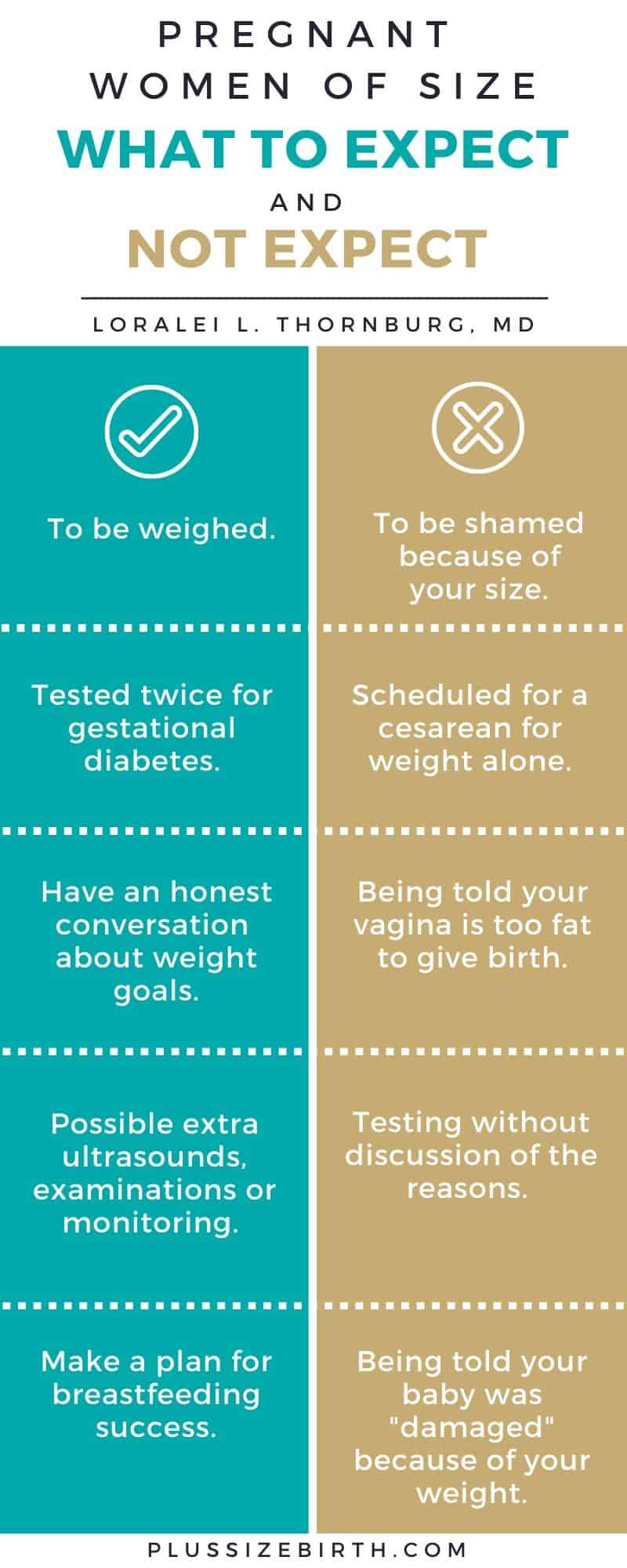Dr. Loralei L. Thornburg, a high-risk OB-GYN, cares for pregnant women of size. She is sharing her insights on what people should and should not expect from their care providers during a plus size pregnancy.

Every pregnant woman of size should expect to be treated with respect and to have her concerns discussed and not dismissed as simply being related to weight without investigation.
– Dr. Thornburg
Congrats on your pregnancy! (Or, if you are considering pregnancy, great work planning ahead!)
Pregnancy is an exciting time; however, for some women with medical concerns, pregnancy can also be a challenging time.
Whatever care model you chose, be it an OB-GYN or a midwife, plan to work closely with your providers to make your pregnancy a safe, happy and healthy one and ensure your little one has a great start in life.
What to expect during a plus size pregnancy:
1. To be weighed
Knowing where you start is important for designing goals for your weight gain in pregnancy.
Without knowing your starting weight, your provider can’t watch for rapid weight gain which is a red flag for complications. If you prefer to be weighted in private, simply ask before your visit. DO NOT expect comments or shaming by the nurse or tech.
DO expect to be weighed in a respectful manner and to have weight recorded without comment.
2. To be tested twice for gestational diabetes
Women who are significantly overweight or have struggled with metabolic issues prior to pregnancy (glucose intolerance, polycystic ovarian syndrome) are at increased risk for gestational diabetes.
Finding and treating gestational diabetes can improve pregnancy outcomes.
Related:
Diabetes in early pregnancy can increase your baby’s risk of heart or spine problems.
Experts recommend not to self-medicate and not to use generic drugs without consulting a doctor.
Therefore, your provider may test you early on to assure that treatment isn’t needed right from the start.
Even if this testing is normal, they will likely test again at 24-28 weeks, when the placental hormones that cause gestational diabetes peak.
3. To have an honest conversation about weight gain goals
Excessive weight gain in pregnancy is linked to having babies that are larger than expected (LGA) and also makes it more difficult to get back to your pre-pregnancy weight.
Eating healthy and staying active can help keep your weight gain within set goals and ensure that you and your baby have the best possible start.
For women who are more than 100 pounds overweight, your provider may recommend no, or minimal weight gain.
As long as baby’s growth is monitored and progressing appropriately, minimal weight gain has been shown to decrease the risk of LGA infants and cesarean delivery.
4. Extra ultrasound examinations or monitoring
Sometimes it can take several examinations to assure that baby is doing well and that all those little baby parts are developing normally!
For women that have other medical issues, like diabetes or high blood pressure, monitoring baby’s growth and fluid may also be needed to assure that your little one is thriving on the inside.
Some providers are doing non-stress testing (NSTs) among women with significant weight challenges.
Weight concerns can increase risks in pregnancy, but it is unclear if NSTs decrease these risks.
These tests are recommended for women with other pregnancy complications, like diabetes, high blood pressure, preeclampsia or fetal growth issues, so don’t be surprised if you are referred for this testing.
5. To make a plan for breastfeeding success
Breastfeeding isn’t easy for anyone.
Plan for success!
Women of size, especially those who require a cesarean delivery or induction of labor, are at risk for delayed lactogenesis (delays in milk coming in).
Related: 6 Things Every Plus Size Breastfeeding Mom Needs
Ask your provider about meeting with a lactation consultant prior to delivery and make a plan to ensure you get help with breastfeeding in the hospital and after going home.
What NOT to expect:
1. To be shamed because of your size:
Every pregnant woman of size should expect to be treated with respect and to have her concerns discussed and not dismissed as simply being related to weight without investigation.
Many providers use the terms obesity or morbid obesity- if you prefer a different term, simply tell your provider.
Many providers will schedule a “private” time without partners in the room during the first visit to screen for and discuss sensitive issues – things like sexually transmitted diseases and intimate partner violence.
This can be an ideal time to discuss how you want weight or other medical issues discussed in front of support people.
2. Being scheduled for a cesarean for weight alone
There are lots of reasons why babies need to be born by cesarean, but obesity alone isn’t one of them.
In general, cesarean delivery should be reserved for things like breech presentation, the placenta being over the cervix (previa) or labor complications.
There are guidelines for when babies are “too big” to safely allow vaginal delivery and depending on your age or birth history this may be recommended.
Related: C-Section For Plus Size Women: Everything You Need To Know!
Educate yourself on your options and discuss the risks and benefits of a cesarean, as well as a vaginal delivery, with your provider.
3. Being told your vagina is too fat to give birth
The vagina is a remarkably flexible organ that can do a lot of things, but one thing it doesn’t do is get fat!
There are babies that have trouble with the birth process; sometimes they don’t come down in the right position or have trouble navigating the pelvis.
Staying active in early labor – moving to a ball, changing positions in the bed, or sitting in a rocking chair – can help your baby navigate the pelvis more smoothly and easily.
Related: 7 Plus Size Pregnancy Exercise Tips
Vaginal “fatness” is not a reason for these troubles.
4. Testing without discussion of the reasons
Your provider may order additional testing for you because of your weight or because of medical complications that you have.
Understanding why testing is being done and what your provider is planning to do with the results is important to help you work together to achieve a great outcome.
5. Being told that your baby was “damaged” by exposure to your weight while inside the womb and is destined to be obese no matter what
We don’t know why some people struggle with weight issues and others don’t. We do know that there is a complex interplay between our genes and our environment that result in different bodies using and metabolizing food differently.
However, we are more than our genes.
The in-utero environment does shape how our bodies respond to the world, but so do our choices after birth.
You can give your baby the best start by getting great care in pregnancy.
Start in pregnancy with a plan for an active, healthy lifestyle regardless of size or weight.
Eating balanced, healthy meals, making active choices for family outings, limiting screen time, and family dinners have all been shown to improve rates of childhood obesity.
Modeling a healthy relationship with food and exercise, and accepting your body at any size, are the best gifts you can give your child, regardless of your, or their, weight struggles.

What are your thoughts on this list and please feel free to share your experiences within the comments below?
Dr. Loralei L. Thornburg is a Maternal Fetal Medicine specialist at the University of Rochester Medical Center. She has active research interests in optimal pregnancy care for women of size. She is an associate professor of Ob/Gyn and the Division Director of Maternal Fetal Medicine for the University of Rochester Medical Center. She and her partners see high-risk obstetric patients at Strong Perinatal Associates, 500 Red Creek Drive, Suite 210, Rochester, NY 14623, 585-487-3352.
- Gestational Diabetes Diagnosis: What Now? A Helpful To-Do List! - October 18, 2023
- Navigating Miscarriage and Self-Blame as a Plus-Size Individual - October 16, 2023
- How much does your BMI increase the odds of shoulder dystocia? - August 11, 2023

Loralei Thornburg MD
Friday 20th of May 2016
I am so excited to see you all on here! Thanks Jen for inviting me to part of the solution & positive conversation around plus-sized birth!
plussizebirth
Friday 20th of May 2016
Thank YOU Dr. Thornburg for being a size friendly care provider and sharing your wisdom with my blog. I hope this article helps many women to advocate for good healthcare during pregnancy and beyond.